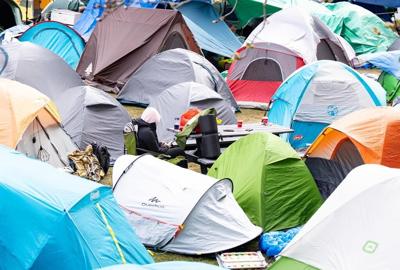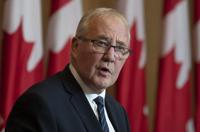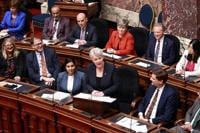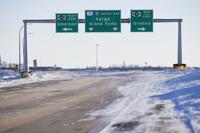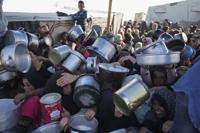MONTREAL - Pro-Palestinian activists said on Monday they have no intention of dismantling their camp at Montreal's McGill University, as the school said it wasn't ruling out calling in police to deal with what it called an illegal encampment.
Dozens of tents were pitched on the lawn of McGill's downtown campus behind a metal fence festooned with Palestinian flags and posters. Cases of bottled water and a small generator could be seen behind the fence, as masked protesters at the gate welcomed supporters dropping off donations including batteries, clothing and medication.
"Students have reiterated their intention to continue the encampment indefinitely, until McGill and Concordia divest from all companies profiting from genocide," read a joint statement published Monday by co-organizers Solidarity for Palestinian Human Rights McGill, Solidarity for Palestinian Human Rights Concordia, Independent Jewish Voices McGill and Independent Jewish Voices Concordia.
McGill said Monday morning that the number of people who have set up tents on campus has tripled since Saturday, and many of them, if not the majority, are not members of the school community.
It also said it had seen video evidence of some people using "unequivocally antisemitic language and intimidating behaviour" during the protest, but it did not provide further details.
"McGill has been steadfast in its support of the rights of our campus community to freedom of expression and freedom of peaceful assembly, with the understanding that these must be exercised within the bounds of McGill’s policies as well as the law," the school said Monday in a statement.
"We have been clear that these encampments violate both."
The institution said its leaders were discussing next steps after lawyers representing McGill students in the encampment informed them the protesters refuse to discuss a timeline to remove the tents.
In an update late Monday, McGill said it would make efforts to de-escalate before asking for police help.
"Should the situation evolve further beyond the university’s protocols, we will have a duty to request police support in order to protect the health and safety of all on site," it wrote.
The school has previously asked one of the organizing groups — Solidarity for Palestinian Human Rights McGill — to stop using the university's name after it says the group made "incendiary posts" following the Oct. 7 attack by Hamas militants on Israel that killed about 1,200 people, mostly civilians. In a Facebook post soon after the attack, SPHR McGill called the militants' actions "heroic" and asked Montrealers to "celebrate the resistance’s success."
Encampment members, meanwhile. are demanding the school divest from Israeli companies it says are "complicit in the occupation of Palestine." They also want the school to cut academic ties with Israeli institutions and denounce Israel's offensive in Gaza, which has led to more than 34,000 Palestinian deaths, according to the local health ministry.
A McGill student and encampment spokesperson who didn't want to give her full name for fear of reprisals from the school or police confirmed Monday that the campers refused to negotiate with the school to remove their tents. She said the campers weren't leaving.
"We understand there may be police repression," she said. "We’ve seen it before, we will see it again. We are ready, we are not moving, we are standing our ground."
While police cars could be seen on nearby streets, there was no visible police presence on school grounds as the encampment members and dozens of supporters gathered for a brief rally Monday morning.
Marwah Mechti, a student from Maisonneuve College, was among those who showed up to encourage the campers.
"It’s not an Arab cause, it’s not a religious cause anymore. It’s a human cause," she said. "By being here in the tents, not eating, not bathing, it shows the determination of students."
The encampment in Montreal, which comes just ahead of the end of final exams at McGill on Tuesday, follows a wave of similar protests across campuses in the United States linked to the Israel-Hamas war. Critics have argued the protests are antisemitic and leave Jewish students feeling unsafe.
Liberal MP Anthony Housefather, a McGill alumnus who represents a Montreal riding, said the encampment is creating a climate of intimidation and needs to be dismantled.
"I've heard over the course of the weekend from literally hundreds of Jewish students and their parents and grandparents that are afraid of what's happening on campus," Housefather said Monday in Ottawa.
"And it's a terrible message to send to the Jewish community in Montreal that has been in Montreal for over 250 years to see those type of remarks calling on Jews to return to Poland that we heard in the videos yesterday. It is absolutely antisemitic and it's unacceptable."
But the McGill encampment spokesperson, who said she was Jewish and a member of Independent Jewish Voices McGill, said the protests are peaceful and aimed at Israel's actions, not Jewish people.
"I want to very clearly clarify: there is a difference between Judaism and Zionism," she said. "And currently the McGill administration and many institutions across the world right now are equating the two. We are here to say, as anti-Zionist Jews, there is a difference."
On Monday, there were signs the campus protest movement within Canada could be spreading.
A protest was beginning at the University of British Columbia's Vancouver campus, with organizers writing on X to ask people to bring tents and sandbags, as well as food, water and heating supplies.
The University of Ottawa, meanwhile, warned its students on Monday that the use of university space is a privilege and not a right.
"While peaceful protest is permitted in appropriate public spaces on campus according to our policies and regulations, encampments and occupations will not be tolerated," read a message signed by Éric Bercier, associate vice-president of student affairs.
This report by Ďă¸ŰÁůşĎ˛ĘąŇĹĆ×ĘÁĎ was first published April 29, 2024.
-- With files from Michel Saba in Ottawa

